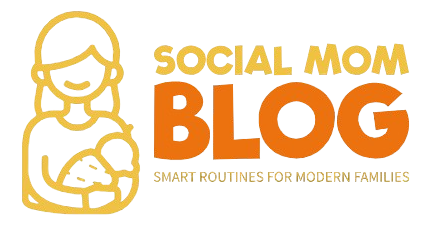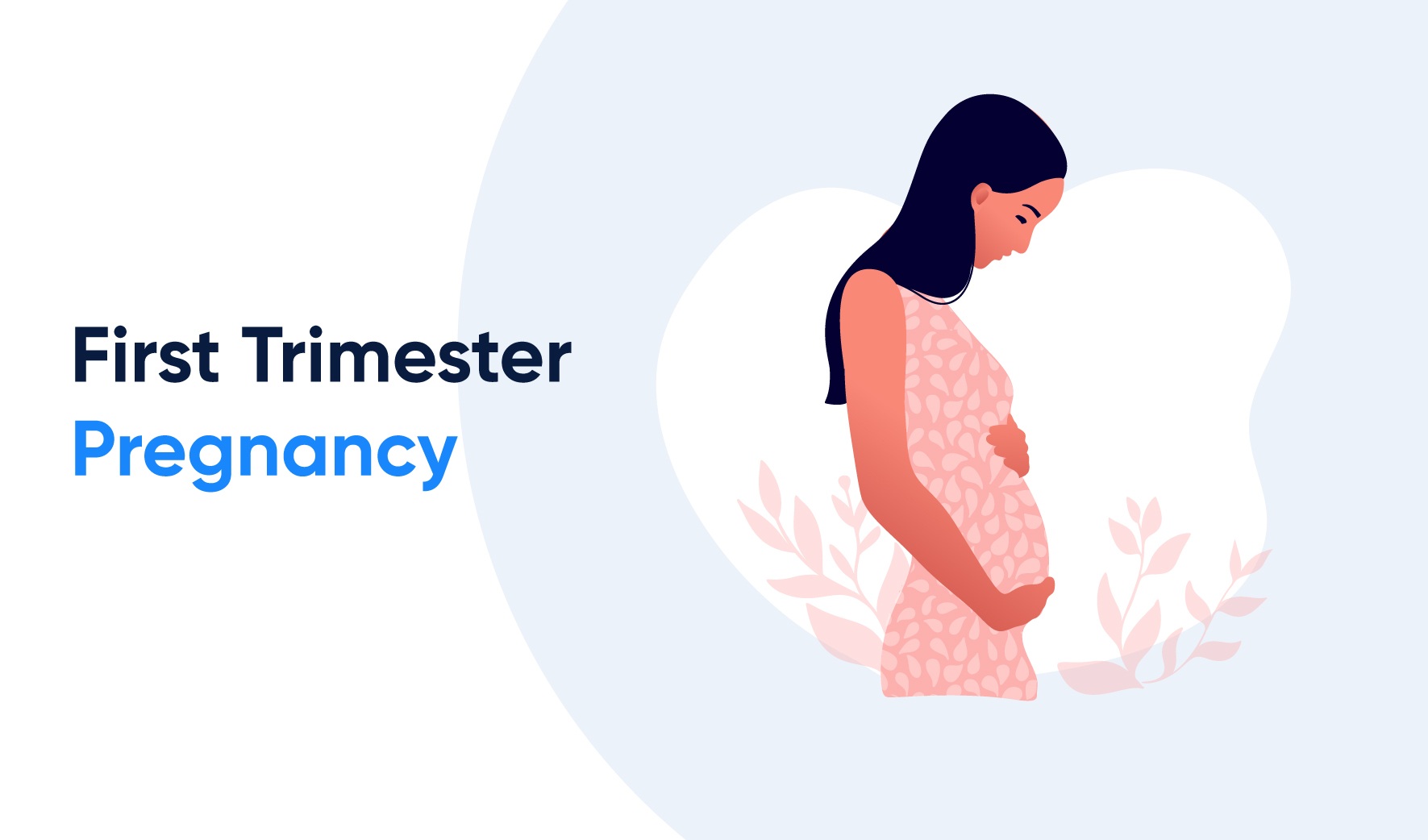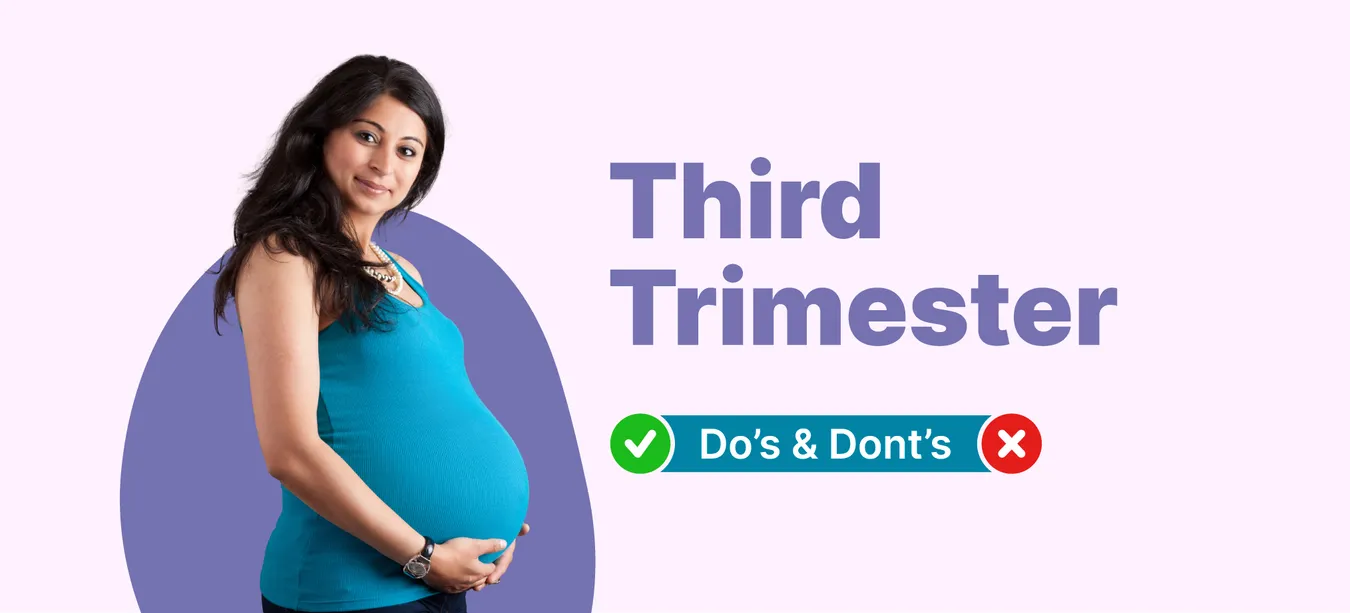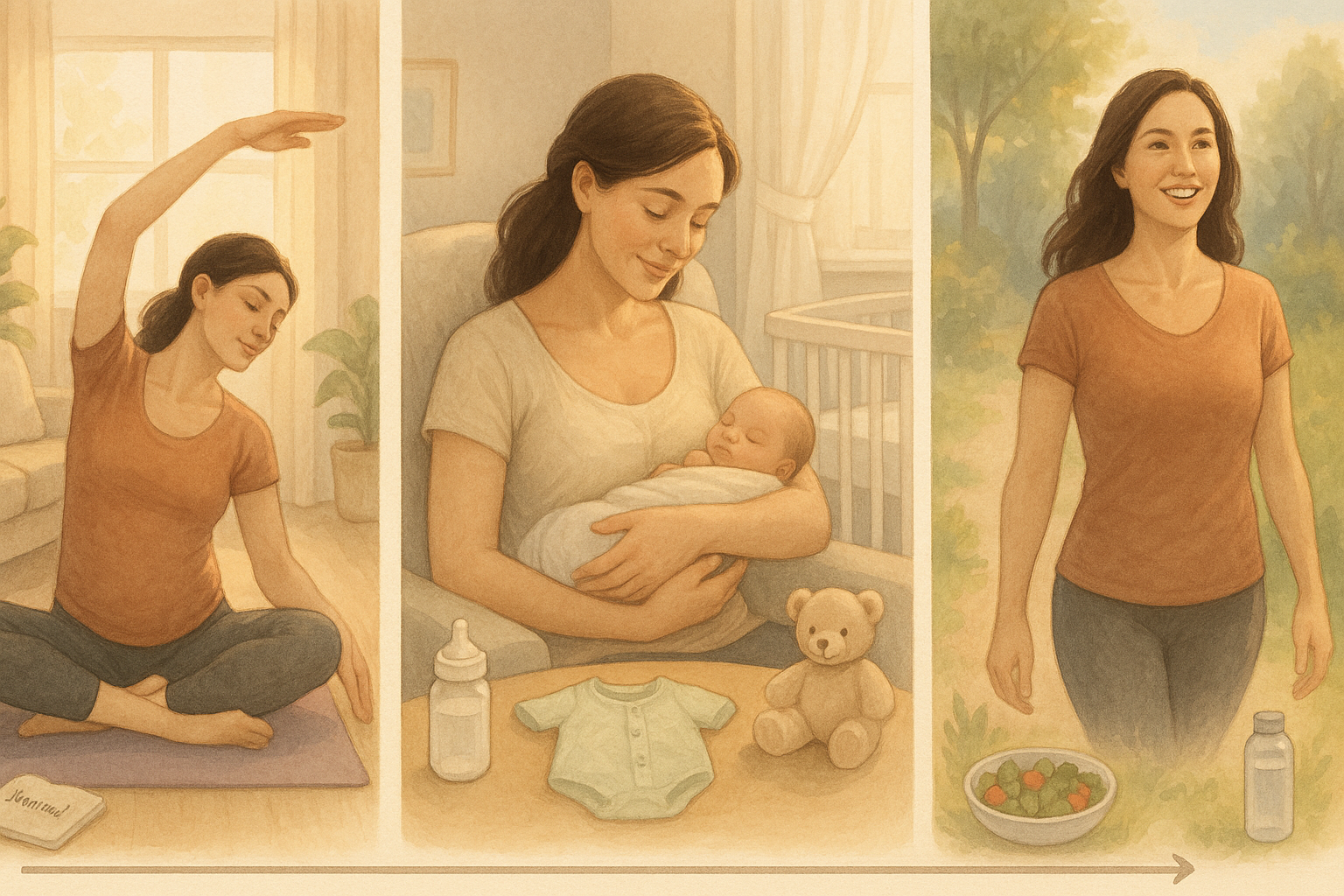So, you just found out you’re pregnant. Congrats! And also… wow, what a ride, right? Welcome to the first trimester of pregnancy, a time that’s basically a wild mix of excitement, hormones, and a whole lot of weird stuff happening to your body. Learning about first trimester symptoms is like getting a cheat sheet for the next few months. We’ll walk through exactly what to expect in first trimester so you can feel confident and prepared. This is just one small part of your larger journey toward pregnancy and postpartum wellness.
This first stage of your pregnancy journey is so important, and knowing the ins and outs can help you feel more in control. We’re here to break it all down, from the super common stuff to the things no one really talks about, and give you some pro tips on how to handle it all.
What is the First Trimester of Pregnancy?
Pregnancy is a journey made up of three trimesters, with each stage lasting about 13 weeks. Your healthcare provider will likely talk to you about your baby’s growth in terms of weeks. The first trimester of pregnancy is a period of rapid and amazing changes, lasting until the 13th week.
It can be a little confusing, but your pregnancy actually begins on the first day of your last menstrual period. This is how doctors calculate your due date and what’s called the gestational age of the pregnancy. This means by the time you’ve gotten a positive test, you’re already a few weeks along. This critical first stage is when all your baby’s major organs and systems are forming.
Why Do Weeks of Pregnancy Seem So Confusing?
It’s totally normal to be scratching your head over this one. The first two weeks of pregnancy aren’t actually part of your pregnancy journey; they’re just your normal menstrual cycle. The first week is your period, and the second week is all about ovulation.
After that, your egg travels down the fallopian tube. If it meets a sperm, bam!, that’s when conception happens. In the third week, the newly fertilized egg makes its way to your uterus to implant, and that’s when your body really gets the memo that you’re pregnant. That’s why by the time you miss your period and get a positive test, you’re already a few weeks along!
How Long is the First Trimester?
The first trimester begins on the first day of your last period and lasts until the 13th week of your pregnancy. It feels a little backward since you’re not technically pregnant for the first couple of weeks, but that’s how doctors measure your baby’s age.
It felt like it would last forever, but looking back, it was just a blurry, nauseous chapter. Be kind to yourself—you’re growing a whole new person!
What are the most common first trimester symptoms?
So, What Can You Really Expect During These Weeks?
Okay, get this: your body is a champ, and it’s doing some pretty incredible stuff right now. So when you suddenly feel queasy at the smell of coffee or need a nap at 2 PM, just know it’s all part of the process. All those early pregnancy symptoms are thanks to a huge surge of hormones doing their thing behind the scenes.
Let’s break down the most common first trimester symptoms and give you the scoop on how to handle them.
How to deal:
- Eat small, frequent meals to avoid an empty stomach.
- Stick to bland foods like toast, rice, or crackers.
- Try ginger in tea or candies.
- Stay hydrated by sipping on cold fluids.
How to deal:
- Rest when you can. Listen to your body and take a nap if you need one.
- Don’t overdo it. Scale back on your schedule and ask for help from your partner.
- Keep moving. A little bit of gentle exercise can actually boost your energy.
How to deal:
- Drink plenty of water to stay hydrated.
- Eat foods high in fiber, like fruits and whole grains.
- If you’re still really struggling, don’t hesitate to ask your doctor for advice on safe stool softeners.
Ugh, heartburn. It’s one of the most annoying pregnancy symptoms, and it’s a real pain. The culprit? The hormone progesterone. It relaxes a little ring of muscle that’s supposed to keep stomach acid where it belongs. When that muscle loosens up, you get that fiery, burning feeling.
How to deal:
- Eat a few small meals throughout the day instead of three big ones.
- Don’t lie down right after you eat. Give your body some time to digest.
- Avoid greasy, spicy, and acidic foods (like citrus fruits).
- Use extra pillows to prop yourself up when you sleep, so gravity can help keep things down.
How to deal:
- Talk to your support system. Your partner and friends are there for you.
- Give yourself a break. It’s okay to feel all the feels.
How Does The Fetus Develop In The First Trimester Of Pregnancy?
While you’re dealing with all those first trimester symptoms, your little one is doing some incredible work. This first trimester week by week look at fetal development shows how fast it all happens.
Think of the first trimester as the universe’s most incredible secret construction project. In just 12 weeks, a single cell transforms into a perfectly tiny human. Let’s peek behind the curtain and see the magic unfold.
The Grand Opening: Weeks 1-4
- The Story: The adventure begins! A fertilized egg arrives and gets to work, building its first home: the amniotic sac, placenta, and umbilical cord. This isn’t just a clump of cells; it’s a life-support system in the making.
- The Blueprint: The very first lines are drawn for the masterpiece to come. A neural tube zips shut, forming the future brain and spinal cord. The heart, a simple tube, prepares for its first beat. Tiny circles for eyes and the hint of a mouth appear on a face smaller than a poppy seed.
- Meet Your Baby: By the end of this month, your little one is about the size of a grain of rice. The foundation is poured!
The Transformation: Weeks 5-8
- The Story: This is the big building boom! Major organs rush onto the scene. The heart, now divided into chambers, starts to beat a rhythmic drum. Tiny buds sprout into arms and legs, and bones begin to harden, replacing soft tissue.
- The Blueprint: The head is still large (all the best ideas start there!), but the profile is unmistakably human. A distinct nose, mouth, and ears take their places. It’s during this incredible phase that the embryo earns a promotion and is now officially called a fetus.
- Meet Your Baby: By week 8, your active little one is about the size of a raspberry, curled up and busy growing.
The Finishing Touches: Weeks 9-12
- The Story: As the trimester nears its end, it’s all about the details! Fingers and toes separate and are tipped with tiny, delicate nails. Your baby becomes a little mover and shaker, practicing opening and closing its hands and mouth.
- The Blueprint: The internal workshop is fully operational; the digestive and urinary systems are up and running. The big reveal happens: gender is determined, though it’s still a secret from the outside world. The best part? You might get to hear the soundtrack—around week 12, a Doppler ultrasound can often pick up the speedy whoosh-whoosh of that mighty little heart.
- Meet Your Baby: By the end of the first trimester, your baby is a perfectly formed, plum-sized miracle, measuring about 3-4 inches… Since all the essentials are in place, it’s a good time to start thinking ahead and learning about newborn baby care fundamentals.
My best tip? Surrender to the nap. I fought the exhaustion for weeks until I realized my body wasn’t asking for a rest, it was demanding one. Once I started listening, I felt so much more human.
Your First Trimester To-Do List
Knowing how to care for yourself in first trimester pregnancy is crucial. Even if you don’t feel or look pregnant yet, your body is doing a ton of important work. Here’s a quick guide to what you should do and what you should avoid during the first trimester of pregnancy to keep you and your baby healthy.
| ✅ What should I do in my first trimester? | ❌ What should I not do in the first trimester of pregnancy? |
|---|---|
| Find Your Healthcare Provider: Your first and most important step. Schedule a visit with an obstetrician or midwife as soon as possible. Early prenatal care is key to preventing complications. Come prepared with a list of questions. | Consume Harmful Substances: Absolutely avoid alcohol, cigarettes (and all tobacco products), and recreational drugs (like opioids). These can cause severe birth defects and developmental issues. |
| Start Prenatal Care Vitamins: Begin taking a prenatal vitamin immediately. Ensure it contains at least 400–800 mcg of folic acid, which is crucial for preventing neural tube defects. Iron and calcium are also vital. | Engage in Risky Activities: Avoid contact sports (football, hockey), activities with a high risk of falling (horseback riding, skiing), or anything that puts pressure on your abdomen. |
| Build a Nutritious Diet: Focus on whole foods: fruits, vegetables, lean proteins, and whole grains. This supports your energy levels and your baby’s growth. | Eat Unsafe Foods: Steer clear of raw fish (sushi), fish high in mercury (swordfish, king mackerel), unpasteurized dairy and juices, uncooked/undercooked meats, and processed deli meats (due to listeria risk). |
| Stay Hydrated and Active: Drink plenty of water throughout the day. This helps with fatigue, supports your increased blood volume, and can ease constipation. Keep up with low-impact exercises like walking or swimming, but be sure to listen to your body and rest when you need it. Focusing on your fitness now can also help with recovery later—consider learning about pelvic floor exercises postpartum. | Overheat: Stay out of hot tubs, saunas, and avoid activities that could significantly raise your core body temperature, as this can be risky for the developing baby. |
What Tests Will I Have In The First Trimester Of Pregnancy?
Regular checkups and tests during pregnancy are key to keeping you and your baby healthy. This care is called prenatal care, and it’s a huge deal. Your prenatal appointments with your provider are when you’ll learn all about what to expect during pregnancy and delivery.
They’ll do checkups, run screenings, and answer all the questions you have, big or small. Think of it like having a personal guide for your pregnancy journey.
When to Call Your Doctor
While most first trimester symptoms are normal, some could be signs of something more serious. If you experience severe first trimester symptoms when to call doctor, it’s always best to be cautious.
- Heavy bleeding or severe cramping (more than a period).
- High fever (over 100.4°F or 38°C).
- Severe vomiting that keeps you from keeping any food or water down.
What to Expect at Your First Prenatal Visit?
It’s time for your first prenatal visit! You’ll probably have a couple of these appointments during the first trimester of pregnancy, especially if your provider considers you to be a high-risk pregnancy. Think of this visit as a deep dive into your health history. You’ll chat about your own medical background, past pregnancies, and your family’s health to give your provider a complete picture.
This appointment is thorough because its main goal is to make sure both you and the growing fetus are healthy.
At this first big check-in, your provider will confirm your due date and get a baseline for your health. Here’s a rundown of what usually happens:
- The Physicals: They’ll take your weight, check your blood pressure, and do a pelvic exam.
- The Lab Work: Expect to give a pee sample to check for any signs of bacteria or other issues. You’ll also have blood tests done to check hormone levels, iron levels, and other important markers.
- The Ultrasound: Many providers do a transvaginal ultrasound at this first appointment.
It’s a pretty cool experience, as they can use it to confirm the pregnancy, measure your baby’s size, and even let you hear the fetal heart rate for the very first time! This is also when you’ll find out if you’re expecting multiples.
Your provider might also recommend other screenings during the first trimester to check for things like chromosomal disorders. These tests help identify any risks, and if needed, they can talk to you about further diagnostic tests. It’s a lot of information at once, but it’s all part of getting the best care for you and your baby.
First Trimester FAQs
When do first trimester symptoms start?
Early pregnancy symptoms can begin very quickly after implantation, which happens about 6 to 12 days after ovulation. For many people, the first noticeable signs—like fatigue, breast tenderness, or nausea—appear around week 4 or 5, often right around the time you miss your period. However, every person and every pregnancy is different; some may feel symptoms earlier, and others may have very few symptoms at all.
How long is the first trimester?
The first trimester of pregnancy is a period of rapid and amazing changes, and it lasts from the first day of your last menstrual period up until the end of week 12.
It might sound strange that you’re already a few weeks pregnant by the time you even know it, but that’s how doctors calculate your due date—it’s called gestational age. This critical first stage is when all your baby’s major organs and systems are forming.
Is bleeding in first trimester normal?
When you see some blood, it’s easy to panic. But here’s a little secret: a little bleeding in the first trimester is pretty common. Sometimes, you’ll have what’s called implantation bleeding. This happens when the fertilized egg snuggles into your uterine lining, which can cause some light spotting. It’s usually a-okay.
That said, you should always listen to your gut. If you have heavy bleeding—like a period—or if the spotting lasts for more than a day, it’s a good idea to call your doctor.
How long does morning sickness last in first trimester?
For most people, the toughest part of the first trimester of pregnancy is around weeks 8 and 9, when morning sickness and fatigue often peak. This is all due to a surge in hormones like hCG and estrogen. Luckily, these symptoms usually start to get better as you near the end of the trimester, with many people feeling a lot more like themselves in the second trimester.
What prenatal care vitamin should I take?
Prenatal vitamins are super important for a healthy pregnancy. Most doctors recommend starting a prenatal care vitamin as soon as you begin trying to get pregnant, because the vitamins and minerals in them help support your baby as it grows. Look for a vitamin that contains folic acid, iron, and calcium. Specifically, you’ll want at least 400 mcg of folic acid, since that’s a key ingredient for supporting your baby’s development. If you’re not sure which one to pick, just ask your doctor!
What are the risks in the first trimester?
Yes, the first trimester of pregnancy does have some specific risks. This is the period when the chance of miscarriage is highest, and there’s also a small risk of an ectopic pregnancy (when the fertilized egg implants outside the uterus). It’s also important to know that pregnancy causes natural changes in your immune system, making you more susceptible to certain illnesses.
This is why it’s especially important to practice good hygiene, like frequent handwashing, and to avoid close contact with people who are sick. It’s totally normal to feel worried, but remember, your healthcare team is there to guide you and provide preventive care throughout your pregnancy.
Which week is the hardest in the first trimester?
For most people, the toughest part of the first trimester is around weeks 8 and 9. That’s when symptoms like morning sickness, fatigue, and needing to pee all the time are often at their peak. These are all thanks to a surge in hormones like hCG and estrogen. Luckily, most people start feeling a lot better as they move into the second trimester.
Conclusion
The first trimester of pregnancy is a wild ride, no doubt about it. But with a bit of knowledge and a good support system, you’ll get through it. These first trimester tips should help you feel prepared for what’s ahead. Remember to trust your body, listen to your doctor, and celebrate every small victory. Before you know it, you’ll be on to the next trimester and new adventures.
Sources:




